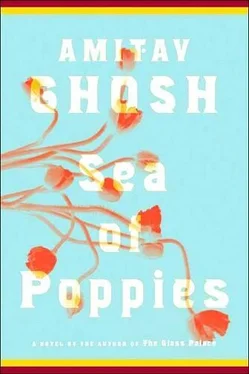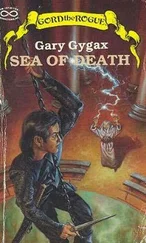+bandanna:The coolinstatus of this word would have amazed Neel, who gave it little chance of survival. That 'bandanna' has a place in the Oracleis not, of course, a matter that admits of any doubt – but it is true nonetheless that this was not the fate that Neel had foretold for it. His prediction was that the Hind. word bandhna would find its way into the English language in its archaic seventeenth-century form, bandannoe. Yet it is true also that Neel never doubted this word's destiny, a belief that was founded in part in the resilience and persistence of the ancient Indo-European root from which it is derived – a word that had already, in his lifetime, been Anglicized into bando/bundo(to tie or fasten). This beautiful and useful word is, alas, now only used as it pertains to embankments, although it was once widely used by speakers of English, especially in its imperative form: bando!(Neel even made a copy of the quote that Sir Henry used in his note on this term: 'This and probably other Indian words have been naturalized in the docks on the Thames frequented by Lascar crews. I have heard a London lighter-man, in the Victoria Docks, throw a rope ashore to another Londoner, calling out, " Bando!" [M.-Gen. Keatinge]).'
Neel's faith in bando/bundowas no doubt influenced by the root's uncommon fecundity, for he foresaw that it would give birth to a whole brood of + anointed derivatives – bund('embankment' or 'dyke', the best known example of which is now in Shanghai, widely considered to be the single most valuable piece of land in the world); cummerbund(the fate of which Neel also failed to properly predict, for it never did replace 'belt' as he had thought it would); and finally bundobast(literally 'tying up' in the sense of 'putting into order' or 'making arrangements'). The passing away of this last into the limbo of the almost-dead Neel could never have foreseen and would have mourned more, perhaps, than any other entry in the Chrestomathy . (Of this too his anonymous descendant might well have written: 'Why? Why? Why this meaningless slaughter, this egregious waste, this endless logocide. Who will put an end to it? To whom can we appeal? Does it not call upon every conscience to rise in protest?') For it is true certainly that this is a word, an idea, of which English is sadly in need. Nor did the contributions of bando/bandhend there. Neel was persuaded that bandin the sense of 'head-band' or 'rubber-band' was also a child of the Hind. term. This would mean that bando/bundodid indeed achieve the distinction of being raised to the Peerage of the Verb, through such usages as 'to band together'.
But to return to bandanna, Neel's own use of this term never came into conformity with its dictionary definition, for he continued, in his lifetime, to apply it to kerchiefs, handkerchiefs, gamchhas, and especially to the cummerbundsand head-cloths that lascars and other working people commonly wore in order to restrain their hair and their kameezes. His descendants, as was their custom, were even more conservative, and would vie among themselves to find uses for the originary forms. Well do I remember the response of an elderly uncle, who, when invited to join a family expedition to a well-reputed cowboy movie, cried out: 'Arre! You think I'd spend good money to watch a band of budmashesrunning around in dungrisand bandhnas?'
+bandar: Neel was totally mistaken in his forecast of how the common Hind. word for monkey would fare in English. One of his pet theories was that migrant words must always be careful to stand apart from each other, in sound and appearance: uprooted homonyms and synonyms, he felt, had little chance of surviving in pairs – in every couple, one would perish. In this instance the beastly sense of bandarwas, in his view, uncomfortably close in sound to an unrelated nautical term of Persian derivation: bander/bunder('harbour' or 'port'). He was persuaded that of the two it was this latter form that would survive in English – partly because the use of bunderin the nautical sense had a very long pedigree in the language, going back to the seventeenth century, and partly because the root was uncommonly fecund in English derivatives. It was these derivatives, he felt, that were most vulnerable to the possibilities of confusion posed by the zoological sense of bandar. True enough that the frequently used term bander-/bunder-boat, ('harbour-boat') was in little danger of being mistaken for a simian conveyance, but there remained another word that might well be the cause of misunderstandings and confusion. This was the venerable sabander/shabander('master of the harbour' or 'harbour-master'), a term which had so long a history as almost to be considered Middle English, and was thus possessed of a powerful claim to protection from the sort of abuse that might result from compounds like shah-bandar. As for the animal, there was another word that would serve it just as well, he felt, and this was wanderoo(from wanderu , the Sinhala cognate of Hind. bandar ) which was also in wide circulation at the time, although it was generally used to mean langur . It was on wanderoothat Neel pinned his hopes while predicting doom for its synonym. Little did he know that both bandarand its collective + logwould be given indefinite prolongations of life by a children's book, while the beautiful wanderoowould soon disappear into a pauper's grave. [See also gadda/gadha.]
bando/bundo (*The Glossary): See bandanna.
+bankshall: Neel would have been saddened by the demise of this beautiful word, once much in use: 'How well I remember the great Bankshall of Calcutta, which served as the jetty for the disembarkation of ship's passengers, and where we would go of an evening to gawk at all the griffinsand new arrivals. It never occurred to us that this edifice ought to have been, by its oracular definition, merely a "warehouse" or "shed". Yet I do not doubt that Sir Henry is right to derive it from the Bengali bãkashala '. He would have been surprised to learn that a humbler kind of warehouse, the godown, had survived in general usage, at the expense of the now rare bankshall.
+banyan/banian: 'This is no mere word, but a clan, a sect, a caste – one that has long been settled in the English language. The clue to its understanding lies in the gloss provided by the Admiral [5] : 'The term is derived from a religious sect in the East, who, believing in metempsychosis, eat of no creature endowed with life. It derives, in other words, from the caste-name "Bania" or properly, "Vania", the last s yllable of which is sometimes nasalized. This caste, long associated with banking, commerce, money-lending and so on, was of course famously vegetarian and this was why the word served for centuries as an essential part of the English nautical vocabulary, being applied to the one day of the week when sailors were not served meat: banyan-day.'
But all this being accepted, how did this word come to assume its present avatar, in which it represents the humble and ubiquitous undergarment worn by the men of the Indian subcontinent? Neel was of course in an exceptionally good position to observe this mutation, which happened largely within his lifetime. His tracing of the genealogy of this series of incarnations counts among his most important contributions to the etymologist's art and deserves to be quoted in full. 'The word banyan's journey to the wardrobe began no doubt with the establishing of its original sense in English, in which it served merely to evoke an association with India (it was thus, I imagine, that it came also to be attached to a tree that became symbolic of the land – our revered ficus religiosa , now reincarnated as the banyan-tree). It was because of this general association that it came also to be applied to a certain kind of Indian garment. It serves no purpose perhaps to ask what that garment originally was. To anyone who has lived as long as I have, it is evident that the garment in question is not so much an article of clothing as an index of Hind.'s standing in the world. Thus, in the seventeenth and eigh teenth centuries, when ours was still a land of fabled riches and opulence, the word banyan/banianreferred to a richly embroidered dressing gown that fell almost to the floor: it was modelled perhaps on the chogaor the caftan/qaftan. [Here the present writer cannot refrain from interjecting that although this species of robe is extinct in India today, several noteworthy specimens are on permanent display in the Victoria and Albert Museum in London.] Even in my own childhood the word banyanreferred always to these sumptuous robes. But at that time, of course, none but the most Anglicized Indians used the word in this sense, the potential for harm being very great. Well do I remember the fate of the unfortunate Raja of Mukhpora, who had a habit of peppering his Bengali with English words. On a garment-buying expedition to the bazar, he was heard to boast, in the hearing of all, that he intended to have his banyansbeaten and washed before they were locked away for the summer. This greatly alarmed the moneylenders, who lost no time in calling in their debts: the results were ruinous for the poor Raja, who had to live out his days in an ashram in Brindavan, with nothing but a pair of saffron chogasin his wardrobe. Thus did he learn why it's best not to get into a banyanfight.
Читать дальше












